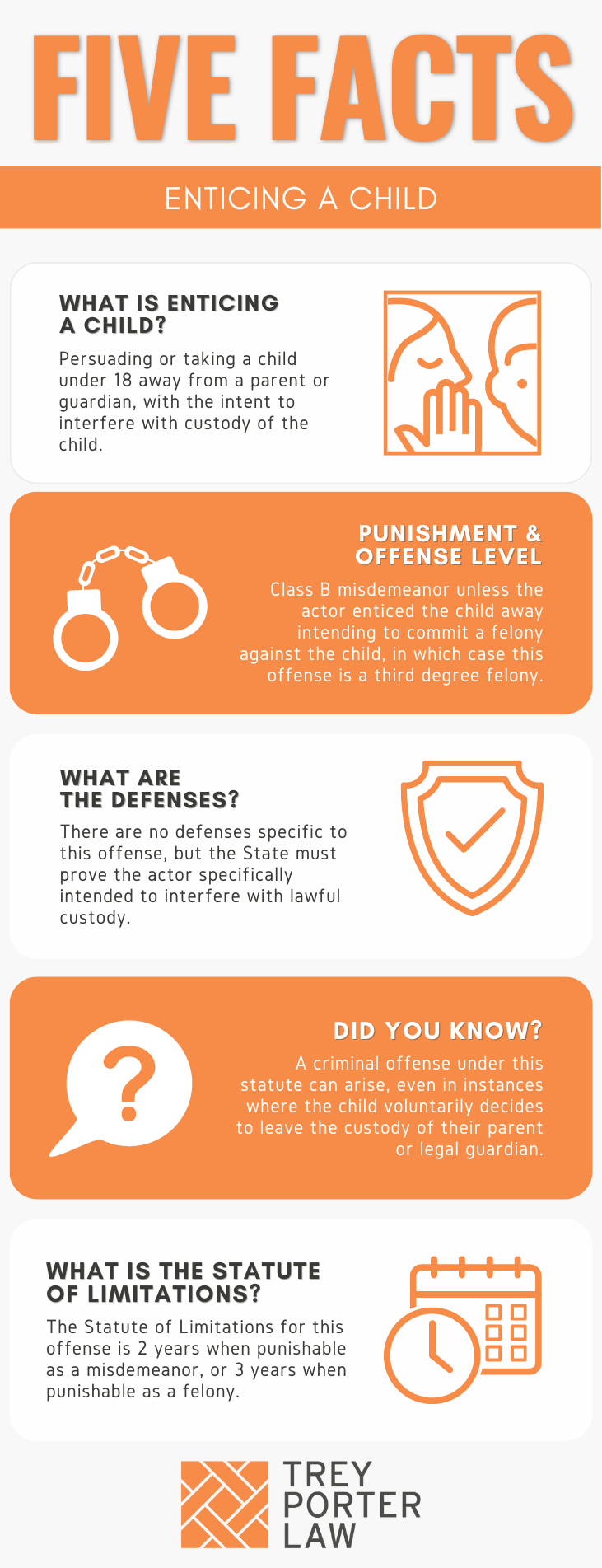WHAT IS ENTICING A CHILD IN TEXAS?
The Texas law against enticing a child prohibits luring or persuading a child away from a parent or guardian who has legal custody.

WHAT IS THE ENTICING A CHILD LAW IN TEXAS?
Tex. Penal Code § 25.04. ENTICING A CHILD.
(a) A person commits an offense if, with the intent to interfere with the lawful custody of a child younger than 18 years, he knowingly entices, persuades, or takes the child from the custody of the parent or guardian or person standing in the stead of the parent or guardian of such child.
(b) An offense under this section is a Class B misdemeanor, unless it is shown on the trial of the offense that the actor intended to commit a felony against the child, in which event an offense under this section is a felony of the third degree.
WHAT IS THE PENALTY CLASS FOR ENTICING A CHILD IN TEXAS?
In most circumstances, enticing a child is a Class B misdemeanor, punishable by up to 180 days in county jail. It becomes a third degree felony, punishable by two to ten years in prison, if the accused intended to commit a felony against the child after taking custody.
WHAT IS THE PUNISHMENT RANGE FOR ENTICING A CHILD IN TEXAS?
The punishment range for enticing a child charged as a third degree felony is between two and ten years, and a maximum fine of $10,000. Enticing a child charged as a Class B misdemeanor carries a possible 180 days in jail, and a maximum $2,000 fine.
WHAT ARE THE PENALTIES FOR ENTICING A CHILD IN TEXAS?
A person charged with enticing a child may be eligible for probation after a conviction, or deferred adjudication without a conviction. If charged as a Class B misdemeanor, the period of community supervision may not exceed two years. A person charged with a third degree felony may be placed on community supervision for up to ten years.
WHAT ARE THE DEFENSES TO ENTICING A CHILD IN TEXAS?
The justification defense of necessity may be raised during a prosecution for enticing a child. A person may also attempt to negate one of the elements the State must prove at trial. For example, the accused may assert the person who had the child did not have lawful custody.
WHAT IS THE STATUTE OF LIMITATIONS FOR ENTICING A CHILD IN TEXAS?
The limitation period for enticing a child charged as a Class B misdemeanor is two years. When enticing a child is a third degree felony, the limitation period is three years.
ENTICING A CHILD IN TEXAS
The legislature enacted the law against enticing a child to punish people, especially potential predators, for luring minor children away from their parent, guardian, or other caretaker.
TEXAS ENTICING A CHILD COURT CASES
The case law regarding enticing a child in Texas demonstrates the statute’s application.
- What if the child went with the person voluntarily? Texas courts have held that a child going with the accused voluntarily, or asking to be taken, is not a defense. For example, in Little v. State, a sixteen-year-old girl became enthralled with religious teachings of her boyfriend’s parents, who were encouraging her to move in with them. The girl’s mother eventually forbade contact with the boyfriend and his parents, but the parents continued to reach the girl by phone, letter, and in person. The girl eventually left home to live with them, and the couple was convicted of enticing a child. The appellate court affirmed.












